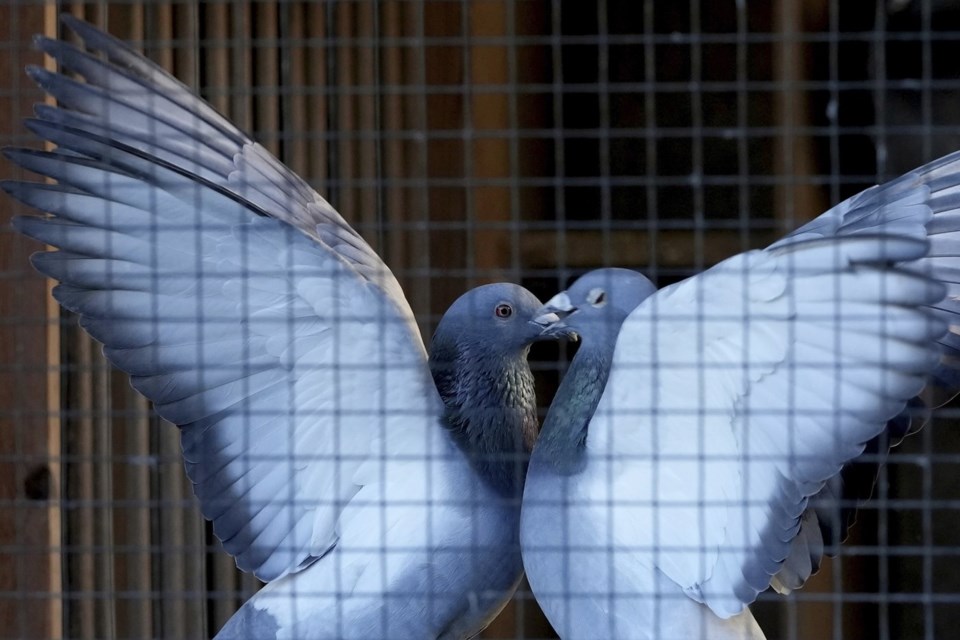RANST, Belgium (AP) — Belgium's once pastoral pastime of pigeon racing has come to this: Drones swoop over lofts where valuable birds are housed to look for security weaknesses, laser sensors set off alarms at night and cameras linked live to mobile apps keep potential thieves at bay — 24/7.
That's what happens when the fast-flying fowl — which in a bygone era were, at best, the toast of local bars — have turned into valuable commodities. The most expensive bird to come out of the top pigeon-racing nation in the world fetched 1.6 million euros ($1.65 million) a few years ago.
No wonder the sport is grappling with an unprecedented wave of unsolved pigeon pilfering that has hit several of the best birds in the business.
This winter season is “extreme,” Pascal Bodengien, the head of the Belgian Pigeon Racing Federation, told The Associated Press. "Not a week goes by without a theft somewhere.”
In one loft, an estimated 100,000 euros ($102,900) worth of pigeons were stolen last week. Overall, no arrests have been made. Prices per bird, said Bodengien, “can vary from 1,000 to 100,000 euros ... and that is what they are after.”
Exact statistics on losses are often not available because the reporting and police investigations are not centralized.
The emotional loss often weighs heaviest of all. The sport involves daily care, over decades, and the rustling of feathers combined with the tranquil cooing often gives breeders a haven of peace in their otherwise bustling lives along with a measure of pride if their birds are winners.
Frans Bungeneers is a breeder of champions. He started at age 8 and is still going strong in his 60s. His life got one of its biggest jolts in November 2016 when thieves broke into his garden shed and took away just about all his top pigeons in a heist of some 60 overall.
“It was such an incredible blow for me. I can tell you honestly, I cried like a little boy because my life’s work was completely destroyed,” Bungeneers said outside his loft where he had to restart his breeding and racing almost from scratch. “I was — I was broken,” he said. “If you have those successes and those birds are then taken away. You know that it takes years.”
He never got his birds back, even though the thieves were caught in Romania and convicted in Belgium. He never saw the 400,000 euros ($410,000) in damages he was awarded because the criminals were ruled insolvent. It makes this winter's string of high-profile theft all the more poignant since he knows what it means to each of the owners.
For pigeons taken in a heist, their racing careers are over. Without proper documentation, one cannot get away with winning a big race and not be double- and triple-checked. That door is closed to thieves. The birds cannot be taken to auction, where prices for top birds regularly veer into the five figures and sometimes into six figures.
“The only option open to them is breeding. They cannot take it any place, they cannot go to China, so we suspect that they are going to the Eastern Bloc countries,” as was the case with Bungeneers' birds, said Bodengien. Still, with no clear lead out there, apart from some grainy infrared video and other sketchy information, “no one really has an overall view on it.”
Bungeneers, who was a police officer until his retirement last year, decries the lack of overall, joint investigations and the fact that often the pricy pigeons are seen in the same light as runaway poultry and receive the same level of investigation. He said it was like comparing a farm pony to a champion thoroughbred.
“I remember a colleague of mine who went into the prosecutor's office and the magistrate said: ‘gentlemen, what are we going to do? Start prosecuting the theft of chickens, rabbits and pigeons?’"
So now, the pigeon-racing federation is warning its members to be extra careful — to the point of not talking to strangers about their hobby.
“If you see that something is happening around the house or around the coops, or see cars that don’t really belong there, immediately note down the license plate, take photos, and possibly call the police,” said Bodengien. “It is really a call that we need to do something about this.”
But for Bungeneers that is also a sign that a way of life is being lost. Instead of the bliss of watching their birds swoop overhead, owners have to watch warily over their shoulder to see if someone is near the loft.
“Cameras, sensors, alarms. All the time, when you go somewhere you have to look at your app to check the cameras," he said. "If there is an alarm, or sometimes the alarm detection goes off and you go check the sheds. And that gives you turmoil."
“You have to invest thousands of euros in your own hobby to keep potential thieves away," he added. "For many people, that is too much and they drop out.”
Raf Casert, The Associated Press

